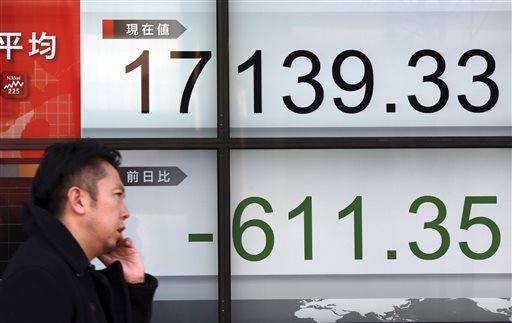Asian markets tumble as oil collapses again

A man walks past an electronic stock board showing Japan’s Nikkei 225 at a securities firm in Tokyo, Wednesday, Feb. 3, 2016. Asian shares stumbled Wednesday as another steep drop in the price of oil reinforced worries about the potential impact on the world economy of job cuts and reduced investment in the energy industry. AP Photo
HONG KONG—The slump in oil dominated the mood on Asian markets Wednesday after falling back below $30 a barrel, hammering energy firms once again and sending stocks deeper into the red.
With the euphoria of Friday’s Bank of Japan stimulus but a distant memory, Tokyo led the regional losses followed by Hong Kong, where insurance giant AIA lost almost a 10th of its value on fears China would tighten insurance rules.
The plunge in oil prices to 12-year lows has sent shudders through world markets, helping wipe trillions of dollars off valuations, even leading to the word “recession” raising its head.
READ: Oil prices sink below $32; lowest in 12 years
Crude resumed its downward trend this week, jettisoning most of the gains seen in a four-day rally last week fuelled by hopes for OPEC-Russian talks on output cuts.
US benchmark West Texas Intermediate crashed more than 11 percent on Monday and Tuesday to fall back through the $30 level for the first time since January 21. Brent lost almost six percent in the same period.
And on Wednesday the losses piled up ahead of a US report that analysts warned could see a further increase in stockpiles. WTI lost one percent and Brent 0.9 percent in early Asian trade.
Oil prices have crumbled about 75 percent since mid-2014, hit by a perfect storm of weak demand, oversupply, overproduction, a slowing global economy and a strong dollar.
READ: Asian markets extend losses as oil sinks below $28
After already taking a hit on Tuesday, regional energy stocks were buffeted again on Wednesday.
“The underlying fundamentals are deteriorating and the talk of recession is getting louder.”
In Hong Kong, CNOOC shed 5.7 percent and PetroChina dived five percent while Kunlun Energy sank 5.6 percent.
Sydney-listed Santos lost 7.5 percent and mining giant BHP Billiton lost 4.2 percent while Woodside Petroleum fell 4.3 percent.
Inpex gave up three percent in Tokyo, where JX Holdings was 2.8 percent off.
‘Talk of recession louder’
The losses followed other big guns in New York and Europe. BP lost 8.7 percent in London after it suffered a loss of $6.48 billion last year and announced another 3,000 job cuts. Chief executive Bob Dudley warned: “We expect 2016 to be tough.”
BP’s American rival, ExxonMobil, managed to stay profitable, but reported a 58 percent drop in fourth-quarter earnings and announced plans to slash its capital budget and suspend its share repurchase programme.
“The underlying fundamentals are deteriorating and the talk of recession is getting louder,” Chris Weston, chief market strategist at in Melbourne at IG Ltd., told Bloomberg News.
“When you see BP coming out with disastrous results and when you see Exxon cutting back on expenditures again, you realise the implication weak oil has on economies.”
Tokyo’s Nikkei index sank 3.1 percent by lunch, while Hong Kong was almost three percent off, Sydney lost 2.1 percent and Seoul shed 1.1 percent. Shanghai slipped one percent.
There were also sharp losses across other parts of Asia, with Singapore, Manila and Kuala Lumpur worst hit.
In Hong Kong, insurance giant AIA lost 8.8 percent in the morning following a Bloomberg News report that China would clamp down on the purchase of overseas cover. AIA’s US shares lost more than five percent.
Beijing wants to close a loophole in its capital controls aimed at stemming the outflow of its depreciating yuan currency, as the economy logs its slowest growth in 25 years.
Manulife, another Hong Kong-listed insurer, shed 5.5 percent.














